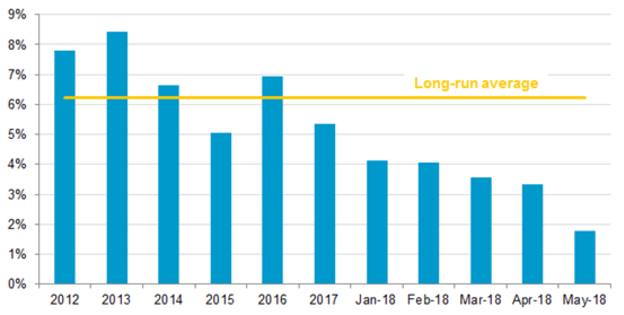
Member opt outs from workplace schemes have remained low, despite recent increases in monthly contributions, Legal & General Investment Management (LGIM) has said.
LGIM, which runs a workplace pension scheme with 2.9m members, saw opt-out rates remain steady in April when minimum pension contributions increased from 2 per cent to 5 per cent, with the worker now paying 3 per cent.
In 2019 they will increase again to 8 per cent, with the employee paying 5 per cent.
The asset manager said opt-out rates - a six-week window when a member is first auto-enrolled in a scheme, or re-enrolled, and has the choice to leave and get all his contributions back - from its scheme had stayed just above 3 per cent in April and below 2 per cent in May.
Other providers have confirmed this. FTAdviser reported in June that master trust Now: Pensions saw a minimal increase in its opt-out rates from 7.98 per cent to 8.18 per cent in that month.
However, the data from Now: Pensions included opt-out and cessation rates.
The data from LGIM did not include cessation rates - when members decide to stop saving and leave their defined contribution (DC) scheme.
Since the introduction of auto-enrolment in 2012, the only official data on cessation rates was revealed in the government's auto-enrolment review, published in December, which showed 16 per cent of savers had ceased their contributions.
According to Veronica Humble, head of DC investment solutions at LGIM, the low opt out rates were "a sign that auto-enrolment is working".
She said: "While some may put this down to inertia, we see this as proof that there is a deeper shift happening among members, with auto-enrolment on the whole being well received.
"We’re positive about the outlook and feel encouraged that members will surprise the industry positively again when the final step up in contributions kick in next year."
Since the introduction of auto-enrolment, LGIM has seen a steady decline in opt-out rates, which it said showed that new workers come into an environment where pension savings have been established as "normal practice".
The asset manager is confident the next increase in April 2019 will not affect opt-out rates significantly.
LGIM said many employees and employers are already contributing at a higher rate than the minimum, according to research published in the government’s auto-enrolment review.
In 2016, about 44 per cent of employees were already contributing 3 per cent or above, and about 27 per cent were already contributing an employee rate of 5 per cent or more.
maria.espadinha@ft.com






